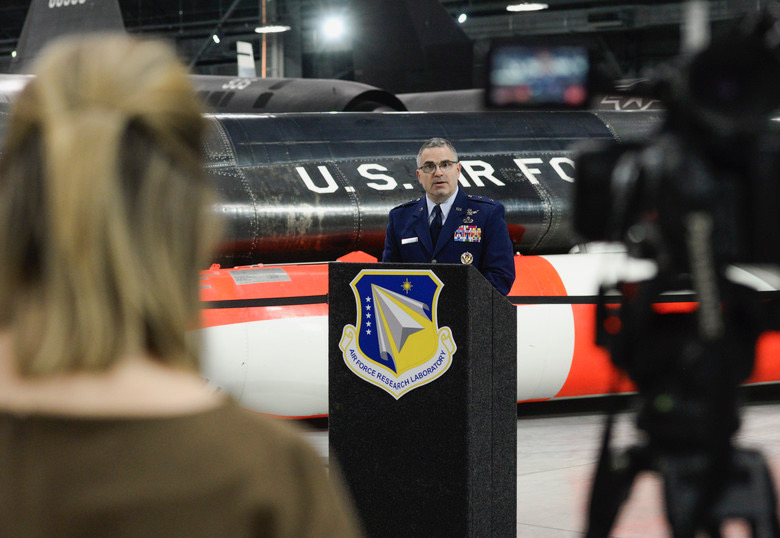AFRL Issues New Tech Challenge, Uses Bespoke Contracts
Posted on

AFRL Commander Maj. Gen. Cooley
WASHINGTON: Air Force Research Lab (AFRL) is putting meat on its 2030 Science and Technology Strategy, combining an innovative approach to funding with a broad challenge to industry for “aggressive, short-duration” R&D projects on transformational technologies.
In its new “opportunity call,” AFRL is looking to fund applied research on in-flight arming and refueling systems; vehicle tracking in commercial imagery; and personnel recovery kit delivery systems. It intends to make four to seven awards, each in the $1 million to $2 million range, according to today’s announcement. Submissions are due Nov. 11, with funding invitations distributed by March 2020.
Eventually, Air Force Explore will branch out across the 2030 Strategy’s “transformational component” — one of three cross-cutting objectives outlined in the April-released strategy document — to develop and deliver “transformational strategic capabilities:” global persistent awareness; resilient information sharing; rapid, effective decision making; complexity, unpredictability, and mass; speed and reach of disruption and lethality.
Timothy Sakulich, AFRL’s executive lead for AF 2030 implementation, said that the “goal is to build a portfolio of ideas that could enable new warfighting concepts providing leap-ahead capabilities.”
The approach to soliciting vendors and to contracting is also unique, Sakulich said, because “the Air Force has created a single path to a level playing field for large industry, small business, startups, academia and government labs to promote solution-oriented thinking and free competition for resources.”
“This is a new approach in the history of the Air Force,” Sakulich said.
Further, the nature of the contract awards will be determined in discussions between the Air Force and the contractor once an idea is chosen. In other words, they will be ‘bespoke’ contracts, which could be based on the traditional Federal Acquisition Regulation (FAR), non-traditional Other Transaction Authority, Section 804 of the 2016 National Defense Authorization Act, or perhaps even set up as public-private partnerships.
ARFL Commander Maj. Gen. William Cooley told Breaking D last week at the Air Force Association 2019 conference that “competing for ideas” rather than pursuing specific technologies is at the heart of the new strategy. Furthermore, he explained, AFRL wants to focus on disruptive technologies that can be transferred to the field rapidly.
According to the announcement, Air Force Explore is a product of collaboration between the Air Force Acquisition Executive (SAF/AQ), Air Force Warfighter Integration Capability (AFWIC) and AFRL.
“Our goal is to establish partnerships that develop capability ideas and mature them into opportunity spaces for the Air Force,” said Reid Melville, AFRL’s lead for Air Force Explore.
The “opportunity call” is different than AFRL’s Vanguard effort to to advance future force concepts that “may fundamentally change how we prosecute wars,” as Cooley told Breaking D. Those programs will be focused on proving out high-risk ideas via prototyping. Cooley said the first Vanguards likely will center on artificial intelligence, autonomy and sensor networking technologies.
An AFRL spokesman explained that while the Air Force Explore efforts will be different from the Vanguard programs, it’s possible that they “might one day become Vanguards.”
Subscribe to our newsletter
Promotions, new products and sales. Directly to your inbox.
